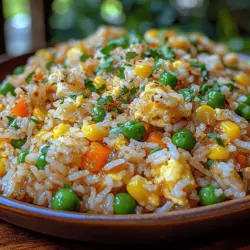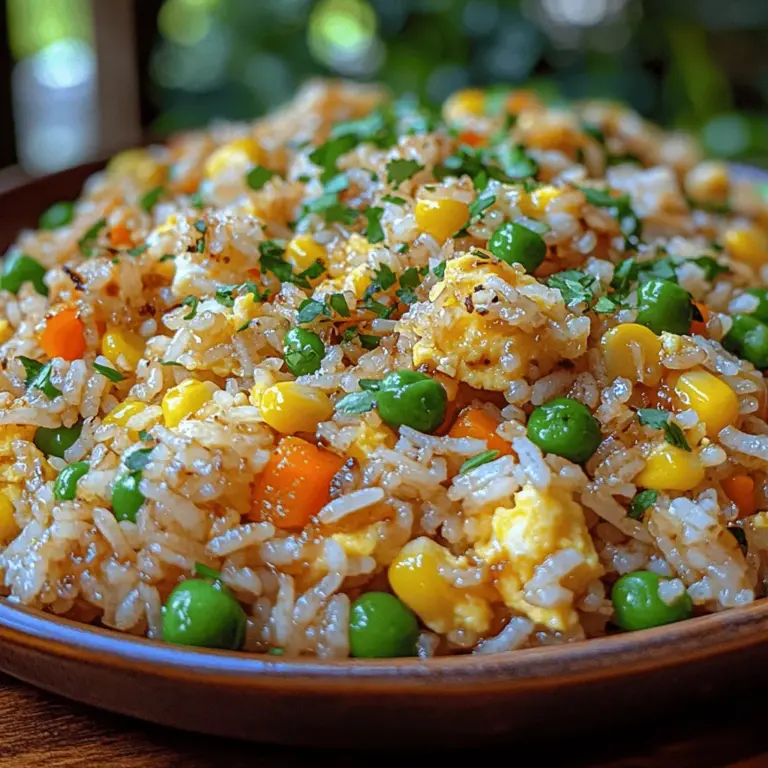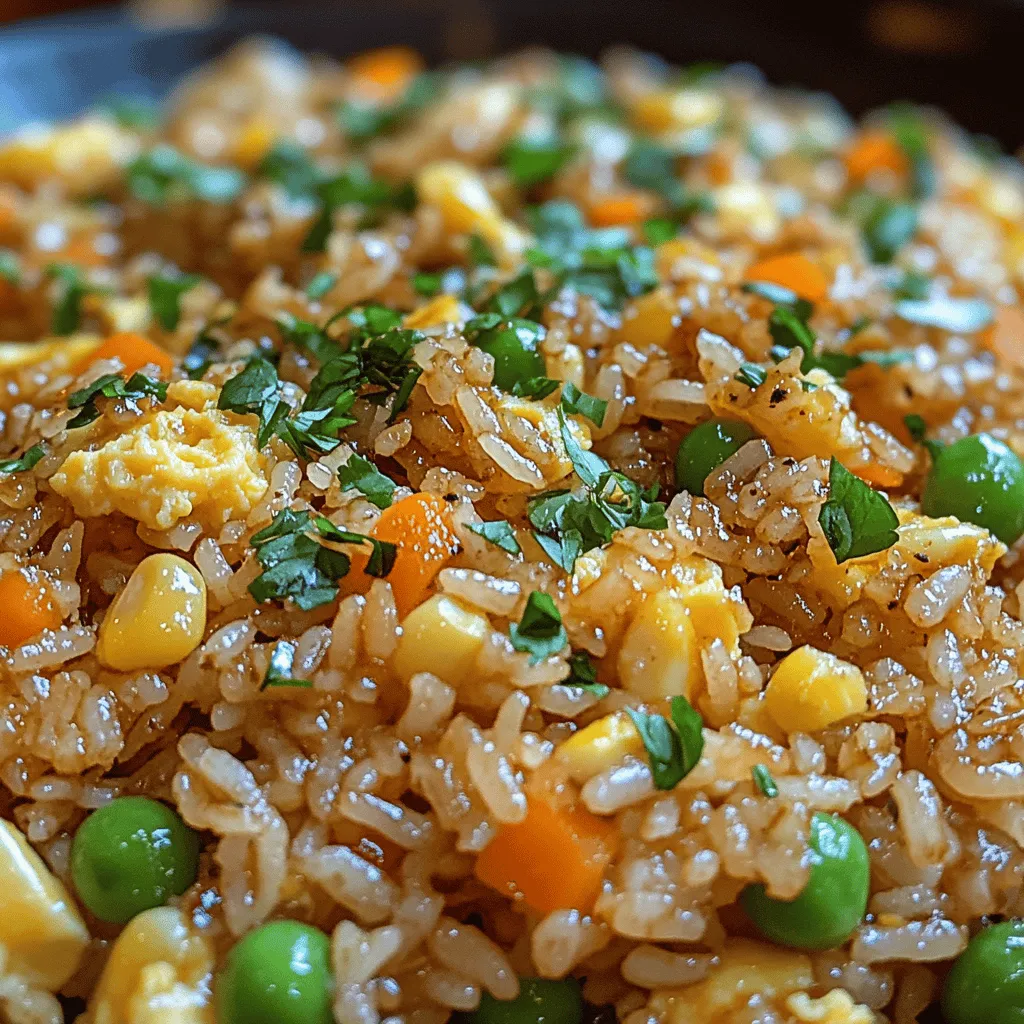Fried rice is undoubtedly one of the most beloved dishes globally, cherished for its satisfying and comforting nature. From street food stalls in Southeast Asia to cozy family dinners across continents, fried rice is a versatile dish that adapts to various tastes, ingredients, and cooking styles. This remarkable dish is not only a favorite for its flavor but also for its simplicity—perfect for those hectic weeknights when time is of the essence. Today, we’ll dive into a quick and delightful recipe for Sizzling Savory Quick Fried Rice that promises to be a hit at your dinner table.
This recipe is designed for those who crave a delicious meal without spending hours in the kitchen. With just a handful of ingredients and a few simple steps, you can whip up a plate of sizzling fried rice that is bursting with flavor and texture. Whether you’re a busy professional, a parent juggling multiple responsibilities, or simply someone who enjoys a quick meal without compromising on taste, this quick fried rice recipe will become a staple in your culinary repertoire.
Understanding the Basics of Fried Rice
To appreciate the beauty of quick fried rice, it’s essential to understand its origins and significance across various cultures. Fried rice has a rich history that can be traced back to ancient China, where it is believed to have originated as a way to use leftover rice. Over time, this humble dish evolved into a culinary staple in many Asian cuisines, each region adding its unique twist. From Chinese Yangzhou fried rice to Indonesian Nasi Goreng, the possibilities are endless, showcasing the adaptability of this beloved dish.
Traditional fried rice is characterized by its key ingredients, which typically include cooked rice, various proteins, vegetables, and seasonings. The beauty of fried rice lies in its ability to incorporate whatever leftovers or seasonal produce you have on hand. However, one crucial component that sets apart a good fried rice dish from a great one is the texture of the rice itself.
The Role of Day-Old Rice
Using day-old rice is a time-honored tip that seasoned cooks swear by. Freshly cooked rice tends to be soft and sticky, making it difficult to achieve that desirable fried texture. When rice is cooked and then refrigerated overnight, it dries out slightly, allowing the grains to firm up. This results in a better texture, enabling each grain to separate easily during the frying process. For the best results, aim for long-grain rice varieties like jasmine or basmati, which tend to hold their shape well when fried.
Ingredients Breakdown
Creating Sizzling Savory Quick Fried Rice is not only about the cooking process; it’s equally about selecting the right ingredients. Let’s take a closer look at the key components that will bring this dish to life.
Rice Choices: Jasmine vs. Basmati
When it comes to choosing the right rice for your fried rice, both jasmine and basmati are excellent options, each with its unique flavor profile. Jasmine rice, known for its fragrant aroma and slightly sticky texture, is a staple in Thai cuisine. It absorbs flavors beautifully, making it an ideal choice for fried rice. On the other hand, basmati rice, with its long, slender grains and nutty taste, is commonly used in Indian and Middle Eastern dishes. It offers a firmer texture that works well in fried rice recipes.
In this recipe, you can use either type of rice, depending on your personal preference or what you have available. However, remember that using day-old rice—whether jasmine or basmati—will yield the best results in terms of texture and flavor.
Oil Selection: Vegetable vs. Sesame
The choice of oil can significantly impact the flavor of your fried rice. Vegetable oil is a versatile and neutral option that works well for frying. It has a high smoke point, making it suitable for high-heat cooking. On the other hand, sesame oil brings a rich, nutty flavor that can elevate the dish to new heights. Many cooks prefer to use a combination of both oils—vegetable oil for frying and a drizzle of sesame oil at the end for added flavor.
When considering health benefits, vegetable oil tends to be lower in saturated fats, while sesame oil contains antioxidants and has been linked to various health benefits. Depending on your dietary preferences, you can tailor your oil selection to suit your needs.
Protein Source: Eggs as a Staple
Eggs are often a staple in fried rice recipes, and for good reason. Not only do they add a delightful richness and flavor, but they also provide a significant nutritional boost. Eggs are an excellent source of protein, healthy fats, and essential vitamins and minerals, making them an ideal addition to your quick fried rice.
To incorporate eggs, start by scrambling them in the pan before adding the rice and other ingredients. This technique helps to evenly distribute the eggs throughout the dish and creates a beautiful, cohesive texture.
Vegetable Variety: Fresh vs. Frozen
The vegetable component of your fried rice is where you can get creative. Fresh vegetables like peas, carrots, bell peppers, and green onions are popular choices, but frozen vegetables can also be a convenient alternative. Frozen veggies are often pre-washed, chopped, and ready to cook, making them a time-saving option for busy cooks.
When choosing vegetables, consider nutritional value and seasonal availability. Fresh, in-season vegetables not only taste better but also add vibrant colors to your dish. However, if you’re short on time, frozen options are just as nutritious and can save you the hassle of washing and chopping.
Flavor Enhancers: Soy Sauce and Oyster Sauce
No fried rice recipe would be complete without a good splash of soy sauce. This essential seasoning adds saltiness and umami, enhancing the overall flavor of the dish. For those conscious about sodium intake, low-sodium soy sauce is a fantastic alternative that provides the same depth of flavor without the extra salt.
Oyster sauce is another flavor enhancer often used in fried rice recipes. It adds a sweet and savory depth that can elevate your dish. While it’s not a must-have, consider adding it for an extra layer of complexity.
Finishing Touch: Sesame Oil and Herbs
Finally, the finishing touch to your Sizzling Savory Quick Fried Rice is a drizzle of sesame oil and a sprinkle of fresh herbs. Sesame oil not only contributes a rich flavor but also adds an appealing sheen to the dish. Fresh herbs, such as cilantro or scallions, not only enhance the visual appeal but also provide a burst of freshness that complements the savory elements of the fried rice.
With all these ingredients and tips in mind, you’re now ready to embark on your culinary adventure. In the next section, we’ll dive into the step-by-step instructions to prepare your Sizzling Savory Quick Fried Rice, ensuring that you can create a dish that’s not only delicious but also satisfying for your busy lifestyle. Stay tuned for the exciting cooking process that will transform your ingredients into a mouthwatering meal!
Step-by-Step Preparation of Sizzling Savory Quick Fried Rice
Preparing the Rice
The foundation of any great fried rice is, of course, the rice itself. To achieve the perfect texture, it is crucial to use rice that has been cooked and cooled properly. Freshly cooked rice tends to be sticky, making it difficult to achieve that signature fried rice texture.
Techniques for Cooling Freshly Cooked Rice
1. Spread it Out: Once your rice is cooked, transfer it to a large baking sheet or tray. Spread it out in an even layer, allowing it to cool quickly. The larger surface area helps moisture evaporate, reducing stickiness.
2. Use a Fan: For quicker cooling, place the tray near a fan or in a well-ventilated area. This speeds up the cooling process and helps dry out the rice.
3. Refrigerate: If you have time, let the rice cool to room temperature and then refrigerate it for at least 30 minutes. This step firms up the grains, making them less likely to clump together when frying.
Importance of Moisture Control in Rice Preparation
Controlling moisture is essential for achieving the ideal fried rice. If the rice is too wet, it will steam rather than fry, resulting in a mushy texture. Cool your rice thoroughly before using it to ensure you have the perfect base for your sizzling savory quick fried rice.
Cooking Process Overview
Now that your rice is prepared, it’s time to move on to the cooking process. Proper technique is key to achieving a delicious result.
How to Properly Heat the Pan for Optimal Frying
1. High Heat: Start by heating your wok or frying pan over high heat. A hot pan is crucial for frying rice properly, as it prevents the rice from steaming and helps achieve that coveted crispiness.
2. Add Oil: Once the pan is hot, add a generous amount of oil (such as vegetable or sesame oil). Swirl it around to coat the surface evenly. The oil should shimmer but not smoke excessively.
Techniques for Scrambling Eggs Perfectly
1. Add Eggs First: For the best results, scramble your eggs first before adding other ingredients. This allows them to cook evenly without becoming rubbery.
2. Stir Quickly: Pour your beaten eggs into the hot oil and stir immediately with a spatula. Keep them moving until they are just set, then remove them from the pan and set aside.
Sautéing Vegetables for Maximum Flavor
The vegetables you choose are as important as the rice and eggs. They add texture, flavor, and color to your dish.
Timing and Order of Adding Ingredients to Achieve the Best Texture
1. Start with Aromatics: Begin by sautéing aromatics like garlic and onion in the hot oil until fragrant. This usually takes about 30 seconds.
2. Stagger Vegetable Additions: Add vegetables that take longer to cook, such as carrots and bell peppers, first. After a couple of minutes, add quicker-cooking vegetables like peas and green onions. This staggered approach ensures that all vegetables are cooked perfectly without becoming mushy.
Incorporating Rice and Seasonings
With your vegetables sautéed to perfection, it’s time to add the rice and seasonings.
Tips for Breaking Up Rice Clumps and Achieving the Right Crispiness
1. Add Rice in Batches: If you have a large batch of rice, add it in portions. This prevents overcrowding the pan and allows for proper frying.
2. Break Up Clumps: Use your spatula to break up any clumps of rice as you add it to the pan. This ensures even cooking and helps achieve that delicious crispy texture.
Final Touches for Flavor Enhancement
1. Seasoning Balance: As you mix the rice, season with soy sauce, sesame oil, and a sprinkle of salt and pepper. Start with a small amount, tasting as you go to avoid overseasoning.
2. Harmonious Blend of Flavors: To enhance the dish further, consider adding a dash of oyster sauce or chili sauce for an extra kick. Fresh herbs like cilantro or a squeeze of lime juice can also brighten the flavors.
Serving Suggestions and Pairings
Sizzling savory quick fried rice is incredibly versatile and can be served in various contexts.
Ideal Occasions for Serving Fried Rice
Fried rice is perfect for weeknight dinners, as it can be whipped up quickly using leftover ingredients. It also shines at meal prep sessions, where you can portion it out for lunches throughout the week.
Complementary Dishes and Sides to Elevate the Meal
To elevate your fried rice experience, consider serving it alongside spring rolls or dumplings. These appetizers complement the dish beautifully and provide a delightful variety of textures and flavors.
Presentation Tips for an Appetizing Look
When serving, consider using a large platter to present the fried rice. Garnish it with sliced green onions or sesame seeds for a pop of color and texture. A side of soy sauce or chili sauce can be offered for those who like a little extra flavor.
Nutritional Information
Understanding the nutritional value of your meals is important for maintaining a balanced diet.
Breakdown of Calories, Protein, Fats, and Carbohydrates per Serving
A typical serving of sizzling savory quick fried rice contains approximately:
– Calories: 350-450 (depending on added proteins and oils)
– Protein: 10-15 grams (depending on the inclusion of eggs or meat)
– Fats: 10-15 grams
– Carbohydrates: 50-60 grams
Discussion on the Health Benefits of the Ingredients Used
Fried rice can be a healthy meal option, especially when loaded with vegetables. Ingredients such as peas, carrots, and bell peppers provide essential vitamins and minerals. Moreover, using brown rice instead of white rice can increase fiber content, promoting digestive health.
Adaptations for Dietary Restrictions
For those with dietary restrictions, fried rice is highly adaptable. You can easily make it gluten-free by using tamari instead of soy sauce. For vegetarian options, simply omit any meat and add more vegetables or tofu for protein.
Conclusion
Making sizzling savory quick fried rice at home is not only easy but also immensely satisfying. With a few simple techniques, you can create a dish that’s delicious, customizable, and perfect for any occasion. Don’t hesitate to experiment with various ingredients and flavors — the beauty of fried rice is its versatility.
Whether you’re using leftovers or creating a fresh batch with seasonal vegetables, the joy of cooking simple, delicious meals that bring family and friends together is unparalleled. So, gather your ingredients, fire up the pan, and enjoy the delightful experience of preparing homemade fried rice. Happy cooking!


